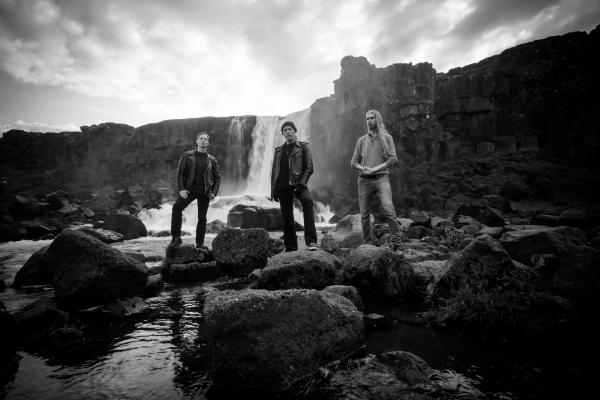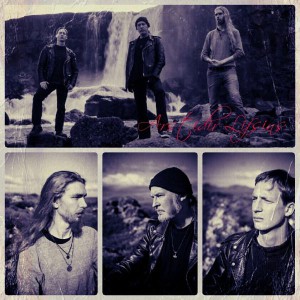
 Interview: Stefán – Guitars, Bass, Piano, Vocals
Interview: Stefán – Guitars, Bass, Piano, Vocals
Hello! In your work there is a significant progression. Do you remember the beginnings, when you were composing the first album and the second album?
 It was in late 2008 when I started the band while I was studying an MA in “Medieval Icelandic Studies“ at the University of Iceland in Reykjavík. It didn’t took long until I met Árni and we already started in November the same year to compose the first songs for what later became our debut album “Jǫtunheima dolgferð“. With our second album, “Vápna lækjar eldr“, it was slightly different since I already had moved back to Germany. We composed, however, most of the material together again.
It was in late 2008 when I started the band while I was studying an MA in “Medieval Icelandic Studies“ at the University of Iceland in Reykjavík. It didn’t took long until I met Árni and we already started in November the same year to compose the first songs for what later became our debut album “Jǫtunheima dolgferð“. With our second album, “Vápna lækjar eldr“, it was slightly different since I already had moved back to Germany. We composed, however, most of the material together again.
What would we imagine when the word ÁRSTÍðIR LÍFSINS is mentioned? Is it something real and tangible or just abstract term?
The meaning of the band name is twofold. At first, it directly translates as “The Seasons of Life“, which refers to the lyrical backbone of each of our albums: on each of them, one or more main characters is introduced in the setting of a late winter. Over spring, summer and autumn several events happen, that are generally displayed before a historical setting of the early medieval Icelandic history. In winter, then, he dies and the circle of his “life-seasons“ ends. This construct, however, should not be understood as an idea of a life that only exists for a year’s time span. It is rather intended to symbolically picture (a) life in the form of a seasonal topic: one is born in winter, and one dies in winter again. In the seasons between, life happens. The second meaning of the band name is more concerned the actual lyrical background of the texts: it is a homage to the great corpus of Skaldic poetry that generally displays medieval Nordic life, history and mythology in very symbolical forms. It furthermore links to our very scientific approach to the Old Norse-Icelandic history, literature and art. In contrast to very many other bands, we treat the concerned subjects with great respect.
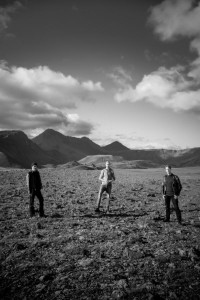 In what way are the duties (writing lyrics and composing music) divided? Is there one person who makes everything or are the duties divided equally? Do you compose together or does everyone compose alone and they you gather to connect individual ideas? Two persons lives in Germany, Arni in Iceland…is it right just now?
In what way are the duties (writing lyrics and composing music) divided? Is there one person who makes everything or are the duties divided equally? Do you compose together or does everyone compose alone and they you gather to connect individual ideas? Two persons lives in Germany, Arni in Iceland…is it right just now?
The composition process is always divided into several different and very intensive sessions. At first I write and compose what we generally call the backbone of a new record: the guitar riff-arrangements and the texts. Then, the material is discussed with Árni and Marsél and we gradually change the composed content and add further instruments and sounds to it. Finally, we start the recordings and the subsequent mixing and mastering. As for now we are based in three different countries (Germany, Iceland and the UK). But due to the great possibilities that the modern internet offers, we are still able to obtain the same form of contact we had when we still stayed in only two countries.
For me is „Aldafǫðr ok munka dróttinn“ epic avantgarde – black metal opus. Was that an intention or you were aiming for something different? Does „Aldafǫðr ok munka dróttinn“ have any sketch or story?
All our albums are strongly connected to each other. They tell of a continuous (fictional) family story, which is historically set in 10th and early 11th century Iceland. While the first album deals with the settlement and the invention of the Alþing in 930 (plus the bad consequences for the household of the main character), it is on the second album the very literary topic of the Family sagas, the blood feuds that is dealt with. On the third, however, we display the peaceful Christianization of Iceland in 999/1000. Around the happenings and stories known about this very political and historical moment in Icelandic history, a story of two brothers is build. They are separated at a very early state and grow up in different religious surroundings. Due to several happenings, they eventually kill each other at the end of the album. Both are only survived by the wife of the Christian brother and their two progenies. As on all previous recordings, the focus on our new album is not only set on several of the story patterns of the Family sagas, but also on further main sources that tell of the first attempts to christianize the Icelanders, and the political powers that enabled them to become more and more powerful. It should be said, however, that we are far away from any institutionalization the content: we only want to display the main sources, entangled in the mentioned, fictional story.
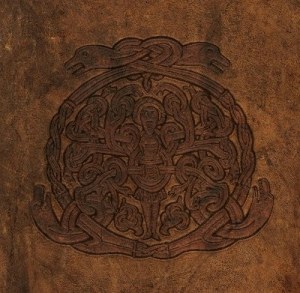 Are you satisfied with the recordings and final version yours CD? I think, than your music is very aggressive, but very fresh too. What do you want to communicate with your sound? The sound is a mix of old black metal face and your new face, right?
Are you satisfied with the recordings and final version yours CD? I think, than your music is very aggressive, but very fresh too. What do you want to communicate with your sound? The sound is a mix of old black metal face and your new face, right?
Yes, we are very satisfied with our recordings. The mixing and mastering takes often the same amount of time that the actual recordings. We are very focussed on the end product, saying that we put a lot of efforts on the correct sound. This is why we are indeed able to create a very fresh mixture of Black Metal and new influences. Since the early start in late 2008 the music of ÁRSTÍðIR LÍFSINS was meant to present a rather inventive form of Black Metal-inspired music. Nothing more, nothing less.
How much effort did you put into a sound production of the album? Sound is very dynamic and every instrument has its place. How long did you stay in the studio or did you record in segments?
We always put massive efforts in our recordings. Not only because we work quite long on the various recordings of the guitars, drums, the massive range of vocals, and external ones such as horns and keyboards. It is also regarded the mixing and mastering, the long-lasting layout process and the writing of the lyrics. Therefore, I am unable to tell you exactly how much time we spent in a single studio. We often switch between private and studio surroundings to record our material. The same goes for the lyrics, which are both written at home and in university libraries due to their scholarly content.
Do you think there is a situation a listener enjoys “Aldafǫðr ok munka dróttinn“ the best?
I think it is generally best if the listen just brings enough time to dip into “Aldafǫðr ok munka dróttinn“. Not only the overall playtime of more than 80 min., but also the in parts quite complex arrangements certainly need more time to be explored than an average metal album with 45 min. playtime.
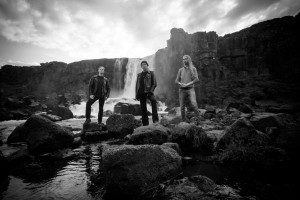 After a few listens of your new album, I cannot help seeing it as your most complex record. On one hand, I truly like it, on the other, I still have not quite got into it. It seems more progressive and evolving and the difficulties I have when trying to grasp it seduce me to listening to it again and again. Have you received such opinions?
After a few listens of your new album, I cannot help seeing it as your most complex record. On one hand, I truly like it, on the other, I still have not quite got into it. It seems more progressive and evolving and the difficulties I have when trying to grasp it seduce me to listening to it again and again. Have you received such opinions?
I am well aware of the fact that our records are a challenge for the listener. But, on the other hand, they were initially made to be what they are: in-depth and massive recordings of Old-Norse inspired Black Metal. Once a listener invested some hours of listening, he gets easily catched by the overall musical, lyrical and graphical concept.
Are you setting up some recording policy? For example that every song must have some particular variety, one or more interesting moments?
No, not at all. All songs and recordings (e.g. albums or EPs) are written in a very natural and free setting. It allows us to be able to in- or exclude influences that are of (no) use for any purpose in the to-be recorded material. So far, it always turned out that way that we are more interested in longer, elaborate songs than shorter ones. This, however, is not carved in stone and might change sometime. But for now we don’t see an argument that speaks for this change.
Can we seek for any continuity between your past releases? Are they some kind of a unit, or does they live their own life?
No, they all belong together. Especially in regards to their lyrical content, they tell a stringent and close story that strongly links all albums together. Their music, however, might show that we gradually evolve; that we add and delete features we find more or less suitable for the current record. Thus, we are indeed a band that indeed changes with every record, but in contrast to many other bands is a change in our music more recognisable over several recordings. Nothing comes unexpectedly, but nothing stays the same either.
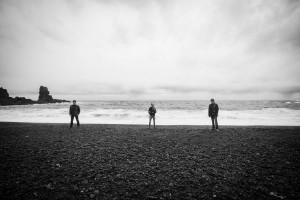 Your music influences like great soundtrack in some darkness historical film. Did you think about video clip or about creation of any shot, which would you compose your music in?
Your music influences like great soundtrack in some darkness historical film. Did you think about video clip or about creation of any shot, which would you compose your music in?
It would certainly be inspiring to do a film project. Such a project, however, would need a bigger budget, which we or our label would not be able to come up with, at least not at the moment. But we would certainly be able to compose and work on a specific piece of music for such a film project.
Lyrics are in your father’s (Iceland?) language, which I welcome, it gives you more originality. Why you do not use worldwide English? Will you stay in that direction also on the future release?
It should probably be made clear, that I am a German citizen that lived in Iceland for a year to conduct parts of my studies. But the band consists of several, changing Icelandic members, of whom one belongs to the three mentioned core members. Icelandic is therefore not my native tongue. Our use of Old-Icelandic, however, is strongly concerned the textual and generally cultural background of the band. Since the very beginning we are strongly inspired by the early medieval Icelandic history. It is only logical that we use Old Icelandic in our lyrics exclusively. English would only destroy our very individual approach.
Is there anything, what really hamper you on this world and what would you unmake, if it is in your strength? What relation do you have to today´s society and values?
In the past few years I finally found some peace with today’s society, at least with most of the western societies. When I was younger, however, my relation to them was strongly imbalanced by various factors. Such factors were (and still are in parts) the catastrophic form how humans treat their environment, how they/we breed and literally produce and kill animals and plants, how we change and destroy very sensitive, natural environments all over the world. And how we even dare to complain about the consequences. What I have learned is, that I am, as a citizen of the western world, able to change the world to my extant: to encourage people to eat no or less cheap and terribly produced food, to rather invest their money into projects and ideas that support a sustainable and better world; and, not to forget: to use their brain for themselves and for others at the same time.
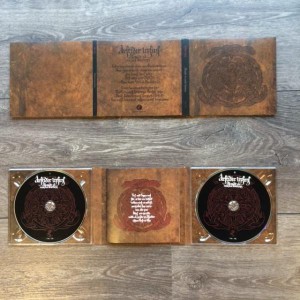 What do you think about the world political situation?
What do you think about the world political situation?
Humanity is today a gigantic maelstrom of monstrous political powers that grind smaller states and interests to dust. Some ten years ago it seems that humanity started to really change for the better but currently it only shows, that this hope was all for nothing. If the situation stays as catastrophic as it is I guarantee that we only will have some less than hundred years to stay on this otherwise very inspiring planet. It is just such a shame that we treat our common creatures the way we do. In the end it might even be a very relief for the world, if we cease to exist.
You spend your childhood in the beautiful unharmed nature for sure. Does that factor left some consequences on you? What is your affinity to nature?
Yes, I have indeed stayed through all my childhood in the countryside and I am very sure that it greatly affected and still affect my way of music writing. This is also why I am still very bound to natural environments, unimportant of where they might be. As for the writing I generally try to become inspired by the fresh winds, the sea coasts and further local landscapes that, in the consequence, surely have their impact on the compositions. Furthermore, it is for certain that this band would not exist if I wasn’t able to travel around Iceland so intensively in the past few years. It is not without a reason that people generally assume our music to be specifically Icelandic.
By the way, what is your opinion on the contemporary black metal scene? Do you have any favourite modern artists and albums? Do you think that Black metal is currently stagnating and has no chance in achieving its earlier glory? Or do you think that Black Metal is close to fulfilling the potential foreshadowed by the old luminaries?
I must admit that I have very small contact with the contemporary metal scene whatsoever. I know some of the newer Black Metal bands and like newer recordings of bands such as DEATHSPELL OMEGA, NIGHTBRINGER, ASCENSION, VEMOD and most of the current Icelandic bands, but my contact to the “scene“ in general is very marginal. My interest is rather concerned “older“ bands such as ENSLAVED, PRIMORDIAL, HELHEIM, KAMPFAR or KATATONIA. Therefore, I have and don’t want to have an opinion on the current “state of the scene“. I am sure there are always good bands popping up here and there. But you might be right with your statement: the glory days of the 90’s seems to have faded away, unfortunately.
On which music you grew up? Did metal reach out you already in puberty or just origins of black metal, or something else?
I grew up with bands such as THE BEATLES, THE ROLLING STONES and PINK FLOYD, as well as great female singers such as Joan Baez or Janis Joplin. My parents listened quite a lot to this inspiring music. I got into metal, however, when I was around twelve or thirteen. As many others I was first interest in Classical Heavy Metal such as IRON MAIDEN, MANOWAR or RUNNING WILD until I came in contact with the German Thrash Metal of SODOM, KREATOR and so forth. I started listening to Black and Death Metal, as well as some Grindcore. It was around the same time in late 1998 or 1999 that I started to play Guitar myself.
Thanks a lot for interview. And good luck in the next days!
Thank you for the interview.
ALL
http://www.arstidirlifsins.net/

